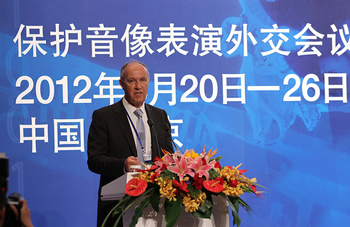
The diplomatic conference to finalize a new international treaty for performers was successfully concluded Tuesday as negotiators from the World Intellectual Property Organization’s member states signed the Beijing Treaty on Audiovisual Performances. The treaty was named in recognition of the city that hosted the final round of negotiations, a poignant location given the fact that China had long been viewed as a copyright scofflaw by the greater IP community.
 WIPO Director General Francis Gurry (Credit: Yuan Wenming)
WIPO Director General Francis Gurry (Credit: Yuan Wenming)
The treaty itself is designed to give audiovisual performers the same kinds of copyright protections other artists enjoy worldwide, including not only possible participation in revenue streams, but also so-called “moral” rights: how and when the performers’ images are used and for what purpose, as well as the right to be clearly identified whenever practical. The document brings to a conclusion 12 years of negotiations.
Though talks began in the late 1990’s, the process broke down over disputes between producers and actors regarding the transfer of rights to audiovisual performances. A compromise was finally reached by SAG-AFTRA and the Motion Picture Association, paving the way for the treaty to move ahead.
“The conclusion of the Beijing Treaty is an important milestone toward closing the gap in the international rights system for audiovisual performers and reflects the collaborative nature of the multilateral process,” said WIPO director general Francis Gurry. “The international copyright framework will no longer discriminate against one set of performers.”
The International Federation of Actors (FIA), a non-governmental organization representing performers’ unions from over 70 countries, was instrumental in negotiating the treaty. SAG-AFTRA, which had representatives among the FIA delegates, applauded the treaty, saying it would extend important economic and moral rights to actors and other audiovisual performers.
“Actors and other audiovisual performers have long needed the crucial protections of this treaty, and now we can finally have them,” said co-presidents Ken Howard and Roberta Reardon in a statement.
The treaty must now be ratified by some 30 eligible parties, including countries and certain intergovernmental organizations. The process could take up to a year to finalize. Performers from around the world, including American Meryl Streep, Brazilian Sonia Braga, Chinese Mei Baojiu and Spanish actors Javier Bardem and Antonio Banderas – appealed for adoption of the treaty.
“With new rights to proper compensation for the use of our work and control over the use of our images and likenesses, actors will have important tools to protect themselves around the world,” said the statement from SAG-AFTRA. “This rising tide can lift the boats of all actors worldwide.”
